
Announcing 2020 Rubik Garage pre-accelerator
We’re very happy to announce the next program of Rubik Garage prea-accelerator for early-stage startups. The 6 months program will be launched on April 27, 2020, and you can apply to participate here untill mid-March! We made some changes & iteration based on our last year experience in the pre-accelerator.
We learned a lot from the founders we had in the program & with their help will improve it for the next founders!
We know more about the challenges and the needs of the startup founders, and also we find out why most of the startups „die” so fast!
In the 2020 program we will work more with the founders & experts to solve & overcome any challenge, maybe even before it becomes a „real challenge”!
The 2020 pre-accelerator includes a kick-off Founders Bootcamp, mentoring, Startup University, Summer Retreat, free co-working space, hackathon, workshops & webinars, scholarships, connecting with investors, DemoDay, a week in an international accelerator and a booth in global startup conf.
Last year, in 2019, we launched the first batch of our pre-accelerator program – Rubik Garage and now we already came to the point when we do the recap, centralize the results and gather our thoughts to draw the conclusions designed to help us prepare for the new edition of Rubik Garage.
The teams we selected were all at very different stages with their customer validation. Some were just beginning the process, whilst others were already in the market with paying customers. It quickly became apparent that applying a rigid curriculum during our program wasn’t going to be the best way to help everyone progress. Instead, it’s about choosing mentors and program leaders with a deep knowledge of customer dev tools and having the flexibility to shape what’s being taught to suit our cohort’s specific needs.
Some of the biggest challenges of the program was finding the balance between pushing teams to be self-motivated/explore new ideas and delivering high-value educational content:
- many founders waste a lot of time in the early days due to lack of some basics
- in a pre-accelerator you need more of a balance between group feedback and small group feedback. Namely, more one-on-one sessions would have been valuable
- The majority of teams needed more focus on validation processes.
- People are afraid to talk to other people, thus the validation process sometimes can include uncomfortable discussions/actions or at least out of the comfort zone
- For all startups it must be very clear from the beginning that no one will do the job for them; our program brought all the resources and skills on the table, but teams need to know what are their needs and how to take advantage of all the resources to make progress
- the majority of the teams are in love with their products – cannot let it go to die!
- social or friends’ opinion matters, but the decision must belong to the founder
- not all advice given to a startup is good or fit – it is the team responsibility to filter and make the right decisions
Stats
To have a clearer image of what Rubik Garage meant, here is a short evaluation after 2019 program with some relevant numbers and results.
Also, bellow you can find some of the reasons that more than half of the Rubik Garage startups “died”:
– they took too long time to build something or nothing was built – no MVP
– during the validation process they didn’t find problem/solution fit
– some of the teams lost focus participating in too many competitions & events for startups
– no team alignment
– they don’t know or don’t understand the importance of prioritization
– not enough commitment and focus
– they don’t believe in the mission, doing things only for fame
– some signed up for the education part only
Namely, Rubik Garage was an opportunity to go big or go home – to make the teams become a real startup and ready to be accelerated and invested, or realize that it won’t work and save time for the next startup idea.
Tag:2020 batch, garage, pre-accelerator, startup
